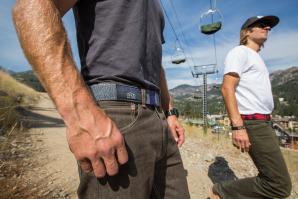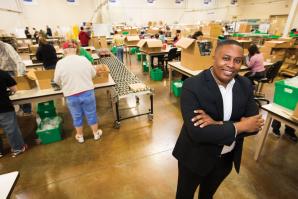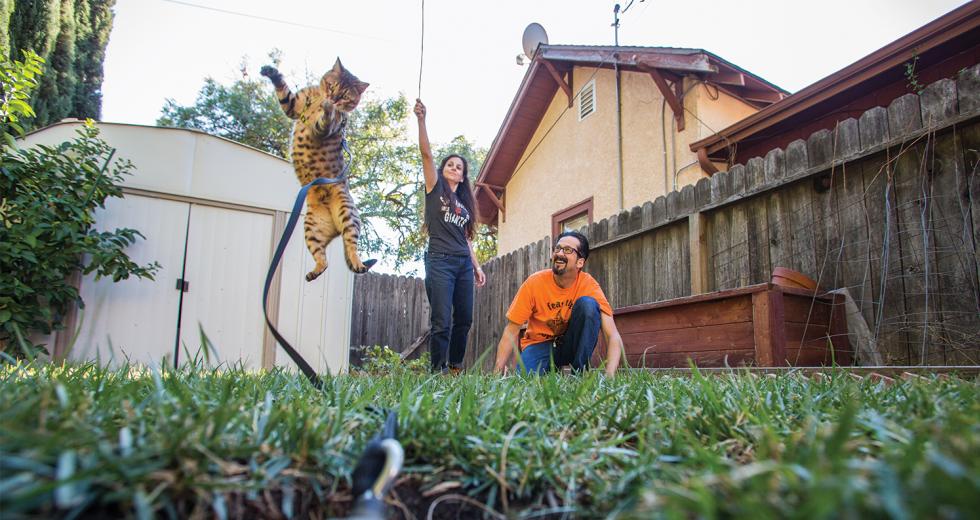Salon owner Carol Milani had never invented anything before, but she needed a way to keep her strong and fearless Bengal cat from escaping the yard. She looked at her sons skateboard and decided a bearing-driven pet anchor would be the best tool.
But nothing like that existed. After an unsuccessful search, Milani took the skateboard to Orchard Supply Hardware and created her own makeshift anchor system. People encouraged Milani to sell her invention, and after securing some private investors, she brought the prototype to Baked Industries manufacturers in Yuba City.
The prototype needed a lot of design help, and we gave them a lot of creative freedom, Milani says.SUREswivel, previously called the Pet Space Base, is the product resulting from the collaboration between the Milanis and Baked Industries.
When Baked Industries introduced Brian Henry, CEO of marketing and development company Hatched Development Inc. (HDI), to the Milanis, the products prototype was complete. Now, Henry works as the business development manager for SUREswivel and handles the companys marketing efforts. Baked Industries brought the inventors together to combine SUREswivel with HDIs X3 Anchor Stakes, a corkscrew-looking stake sold to the military to hold down tents.
The length of the X3 Anchor Stake coupled with the SUREswivel creates an anchor strong enough to tether and secure any size domestic animal, including horses. Eventually, the product could be expanded to be marketable for boat anchoring and RV awning tie-downs, as its already secure enough to hold 2,500 pounds when using all six anchor points.
Most ideas for products develop because their creators see unmet needs in the marketplace. Still, many fail to launch due to lack of planning beyond the prototype. Others fail to protect their idea and see it stolen. While most ideas do not succeed, there are steps that product inventors and developers can take to increase the chances of success.
What happens to so many people is they have an idea, they spend all of their money on it, and they get it made and then they have no idea what to do and it just dies.
Brian Henry, CEO, Hatched Development Inc.
Milani warns anyone looking to create their own product to secure
development, intellectual property and utility patents, since a
design patent alone only protects the look of the product and not
the functionality.
SUREswivel was initially funded by personal money from the owners, which allowed them to create the prototype. Henry avoided invention submission companies, who he thinks prey on start-ups by promising to help develop an idea in exchange for money. Instead, he recommends using as many local resources and contacts as possible to cut costs.
What happens to so many people is they have an idea, they spend all of their money on it, and they get it made and then they have no idea what to do and it just dies, he says.
The Milanis did as much as they could to save money, including assembling the first 1,000 units, produced by Baked Industries, in their home.
A second order of 10,000 units has been placed, and there are contracts in place with several distributors the couple found by attending industry tradeshows.
Milani says she has fought hard throughout the development process to assure the product can be manufactured in the U.S. because she says she supports domestic job creation. Distributors and retailers told Milani that if she produced her product in China they could reduce the cost to produce SUREswivel and sell it at a lower price.
Meanwhile, Kristin Ward was already the successful owner of
Diapeze, a cloth diaper business she runs from her home, when she
and her friend Amanda Wucher-Aller decided to make their own
eco-friendly laundry detergent to sell with the cloth diapers.
The women started working on A Happy Green Life laundry wash by experimenting with various laundry detergent recipes found in books and on Pinterest.
What they found were lists of ingredients they considered unsafe or environmentally unfriendly, including borax, which can deteriorate elastic, and soap flakes that leave a residue on clothing.
Their searches for alternative ingredients lead them to Sierra Chemical Co., a local, family-owned business that sells, mixes and bags the chemicals they needed for laundry detergent. Ward and Wucher-Aller store the detergent in Wucher-Allers garage and add fragrances before shipping an order. Keeping operations for A Happy Green Life at home also allows the women to tend to their young children when theyre not fulfilling orders.
After they finalized the product itself, they tested various containers before settling on a company that makes recyclable packaging.
In the beginning, we bought the cheapest stuff that would get us through, and now that weve been in it for awhile, having a cohesive look is more important to us, Wucher-Aller says of the recyclable packaging.
Using spreadsheets, Ward organized the startup costs and income goals. Financially, both owners families have supported the business. Wards family gave the women a private loan.
To find their test market, Ward turned first to a Facebook group she had created for work-at-home moms. This allowed them to reach their target audience for product feedback and business advice. The women also relied on LinkedIn groups including How to Start a Business to develop their business plan.
The women attribute success of A Happy Green Life to a good foundation, including a solid business plan, partnership agreement and one of the most challenging assets to find good insurance. Joining the Soap Makers Guild enabled the women to afford insurance by buying into a group plan. They recommend that all small businesses find support and discounts through industry trade groups.
Currently, nine online retailers are selling the product nationally and internationally. The women have also used online co-ops and baby bargain websites to distribute samples. Ward picked up more national and international customers through the companys Facebook advertising and a fan page.
Those are customers we wouldnt have reached otherwise, says Ward.
The company is currently on track to meet production and sales goals for the year and is looking ahead to next year when it expects to begin selling the product in stores.
Everyone has to have laundry wash, Wucher-Aller said. Why wouldnt you buy a local, safe for your skin, safe for your kids product? It just makes sense to do that.
As an esthetician and spa owner, Stella Chung wanted to develop
an anti-aging lip moisturizer as a finishing product for facials.
Her first steps were to seek a chemist and take out a personal loan to finance the project. After researching skin care labs to find a suitable match for her product goals, she settled on a lab in Texas. That company worked to develop and test her product, and now it manufactures and packages the balm as well.
Even though theyre someone thats going to make your product, you want to make sure that youre going to be able to have the right relationship with them because youre going to be in constant interaction and contact, Chung says.
After a year of testing and finalizing, Chung began using the product on her clients. At first she didnt tell them that the lip treatment was something she created because she wanted an unbiased reaction. Although there are marketing plans in place, Chung and her husband were able to sell their product to existing spa customers and develop the business slowly.
You’ve got to have the passion to keep on moving forward even though you have challenges.
Stella Chung, esthetician and spa owner
Any entrepreneur or somebody thats looking to start some kind of
product really has to be serious about how they get involved in
things because they will easily spend six figures. If you stop
halfway, it could easily just fade away, says John Vu, Stellas
husband, who works as a social media consultant and helps with
marketing the lip treatment.
He also emphasizes writing everything down and seeking the help of an attorney to protect the idea and business.
Chung knew the product was successful when clients began to purchase and repurchase the lip treatment, including some celebrity clients such as Barbra Streisand.
Stella hopes to sell her lip treatment at luxury spas and tap contacts shes met at spa trade shows to expand beyond the local market.
You’ve got to have the passion to keep on moving forward even though you have challenges, Chung says. You’re going to have to keep on pushing until you get the product that you want, and never settle.
Recommended For You

Arcade Winnings
An all-weather accessory company advances to the next round
A slope-loving trio needed durable, weatherproof belts that would fit comfortably, last a long time and look good. So the self-proclaimed ski bums decided to make their own. Olympic Valley-based Arcade Belts launched three years ago from a living room and specializes in belts made specifically for winter-sport enthusiasts.

Rapid Success
Chris Johnson is an impatient inventor with a purpose
Chris Johnson is the inventor of Rapid Ramen Cooker, a square, microwaveable bowl that cooks ramen in four minutes. What he evidently lacks in patience, he makes up for in ingenuity.



